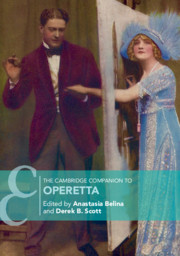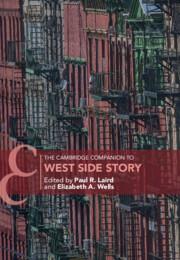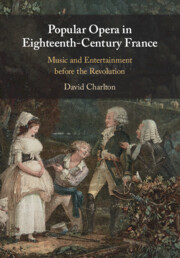The Cambridge Companion to Operetta
Those whose thoughts of musical theatre are dominated by the Broadway musical will find this book a revelation. From the 1850s to the early 1930s, when urban theatres sought to mount glamorous musical entertainment, it was to operetta that they turned. It was a form of musical theatre that crossed national borders with ease and was adored by audiences around the world. This collection of essays by an array of international scholars examines the key figures in operetta in many different countries. It offers a critical and historical study of the widespread production of operetta and of the enthusiasm with which it was welcomed. Furthermore, it challenges nationalistic views of music and approaches operetta as a cosmopolitan genre. This Cambridge Companion contributes to a widening appreciation of the music of operetta and a deepening knowledge of the cultural importance of operetta around the world.
- Provides an accessible and informative overview of the cultural history of operetta in different countries and its place in the history of musical theatre
- Introduces the reader to the way operetta was received by diverse audiences
- Offers the first collection of essays in English by an international group of scholars on the subject of operetta - spanning its composition, music and performance
Reviews & endorsements
'… finally, a collection of essays published by Cambridge University Press makes some of these new debates [about operetta] available to an English speaking audience … a great overview of many new trends in scholarship … attractively packaged and priced.' Kevin Clarke, Operetta Research Center
'… the editors can be congratulated on the breadth and variety of the contents. Aimed at varying levels of knowledge as the chapters are, the book should provide informative reading for operetta students of a wide range of knowledge …' Andrew Lamb, www.zarzuela.net
'I defy you not to learn something and expand your knowledge by reading this Companion. It is also the sort of book to return to again and again to look up a reference, or to find information in one of the many bibliographies. In short, a veritable mine of information and well worth the small price asked … Highly recommended!' John Groves, Operetta Research Center
'[This book] deserves to take its place ... on the short (but growing) bookshelf of every operetta lover.' Richard Bratby, Gramophone
‘The 18 essays in this excellent compendium look at the origin, development, and distinct national characteristics of various types of light musical dramatic types that came to be known collectively as operetta … this book will interest scholars of Jewish studies as well as scholars of music and drama. The bibliography is excellent, as are lists of books and films … Highly recommended.’ W. E. Grim, Choice
Product details
November 2019Adobe eBook Reader
9781316865354
0 pages
0kg
11 b/w illus. 2 tables 6 music examples
This ISBN is for an eBook version which is distributed on our behalf by a third party.
Table of Contents
- Introduction Anastasia Belina and Derek B. Scott
- Part I. Early Centres of Operetta:
- 1. French operetta: Offenbach and company John Kendrick
- 2. Viennese Golden-Age operetta: drinking, dancing and social criticism in a multi-ethnic empire Lisa Feurzeig
- 3. London and Gilbert and Sullivan Bruno Bower
- 4. Hungarians and Hungarianisms in operetta and folk plays in the late Habsburg and post-Habsburg era Lynn Hooker
- 5. Operetta in the Czech National Revival – the Provisional Theatre years Jan Smaczy
- Part II. The Global Expansion of Operetta:
- 6. Going global: the international spread of Viennese Silver-Age operetta Stefan Frey
- 7. Spain and Zarzuela Christopher Webber
- 8. Camping along the American operetta divide (on the road to the musical play) Raymond Knapp
- 9. Operetta in Russia and the USSR Anastasia Belina
- 10. Operetta in the Nordic countries (1850–1970) Pentti Paavolainen
- 11. Operetta in Greece Avra Xepapadakou
- Part III. Operetta since 1900:
- 12. The operetta factory: production systems of Silver-Age Vienna Micaela Baranello
- 13. Berlin operetta Tobias Becker
- 14. Operetta in Italy Valeria De Lucca
- 15. Operetta in Warsaw Anastasia Belina
- 16. British operetta after Gilbert and Sullivan Derek B. Scott
- 17. Operetta during the Nazi regime Matthias Kauffmann
- 18. Operetta films Derek B. Scott
- 19. 'Jazz was the dynamite that exploded the harmlessness of the Viennese operetta!' (Interviewer: Ulrich Lenz.) Interview with Barrie Kosky.






